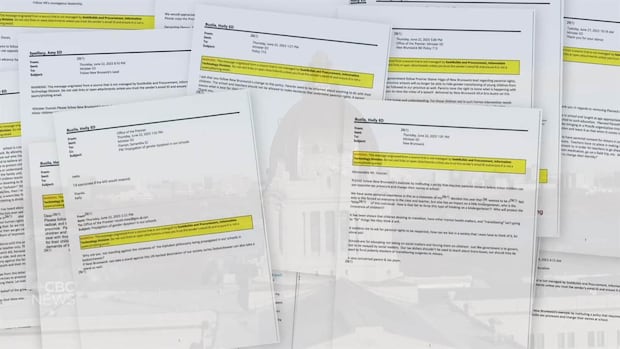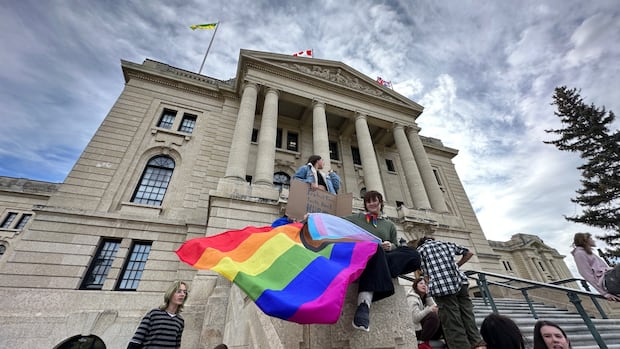Saskatchewan’s Court of Appeal has ruled a challenge to the province’s pronoun law can continue.
The law requires parental consent for children under the age of 16 who want to use a different name or pronoun at school.
On Monday, the Court of Appeal ruled that litigation over the law can continue at the Court of King’s Bench.
It clears the UR Pride Centre for Sexuality and Gender Diversity, an organization at the University of Regina, to argue that the amendments to Saskatchewan’s Education Act violate sections 7 and 15 (1) of Charter of Rights and Freedoms. Those are sections related to freedom of expression and security of the person.
That’s despite the province’s use of the notwithstanding clause on challenges related to sections 2, 7 and 15 of the Charter.
Bennett Jensen, director of legal for Egale Canada, which is representing UR Pride in court, said having a judge issue that declaration is important for the public, even if the challenge cannot overturn the law due to the notwithstanding clause.
“So they’re not just hearing from communities that are affected, they’re not just hearing from governments, they’re hearing from the experts in the constitution who have, on the basis of evidence, ruled on whether something is constitutional or not,” Jensen told CBC News in a interview on Monday.
READ | Court of Appeal Decision – Saskatchewan (Minister of Education) v UR Pride Centre for Sexuality and Gender Diversity:
The Court of Appeal found that UR Pride can also amend its challenge to seek a declaration that the policy violates section 12 of the Canadian Charter of Rights and Freedoms, related to cruel and unusual treatment or punishment.
The province did not invoke the notwithstanding clause for that section of the Charter.
This judgment does not determine that the Education Act “operates in a way that limits any person’s Charter rights,” as that issue was not before the court and the government has not conceded that point.
However, part of the application seeking to have the policy declared unconstitutional must be struck, the Court of Appeal ruled. Since the policy is now law and there is no “allegation or evidence that any person has suffered harm because of it,” the challenge to the policy is moot, the decision reads.
In a statement, the Government of Saskatchewan repeated its explanation for introducing the policy, saying it remains committed to protecting “parents’ rights to be involved in their children’s education.”
“As the matter remains before the Courts, we will not comment further,” the statement said.
Bennett said Egale Canada is ready to continue with its legal challenge and prepared if the Saskatchewan government appeals Monday’s decision to the Supreme Court of Canada.
The written reasons for the decision were provided by Justice Robert Leurer, with concurrence from Justices Georgina Jackson, Lian Schwann and Jerome Tholl.
Justice Neal Caldwell wrote in dissent.
How Saskatchewan got here
The legal battle goes back to August 2023, when the Saskatchewan government announced the pronoun consent policy.
Later that month UR Pride filed an application against the new policy, requesting a judge strike down the changes. It said the policy was not justifiable under the Canadian Charter of Rights and Freedoms, and denied gay and gender-diverse students “a safe and welcoming educational environment in which to be themselves.”
UR Pride also argued that the policy outed children who weren’t ready to express their new identity to their parents, and that that would potentially put them at risk of harm.
WATCH| No evidence that Sask. consulted about pronoun policy despite premier, education minister claims: documents
No evidence that Sask. consulted about pronoun policy despite premier, education minister claims: documents
Saskatchewan’s Ministry of Education has released copies of 18 letters sent to the province encouraging it to develop a policy addressing pronoun use in schools.
The province then passed The Parents’ Bill of Rights in October 2023, writing the policy into law and employing the notwithstanding clause — a rarely used measure that lets governments override certain Charter rights for five years.
The province then applied to have UR Pride’s challenge dismissed.
In response, UR Pride amended its legal challenge to say that the law violates Section 12 of the Charter, which protects Canadians against cruel and unusual treatment or punishment. The province did not name Section 12 when it invoked the notwithstanding clause.
In a Feb. 16, 2024 decision, Court of King’s Bench Justice Michael Megaw ruled in favour of UR Pride, allowing it to make its case on the constitutionality of the new pronoun rules, despite the use of the notwithstanding clause.
The Government of Saskatchewan appealed that decision, saying its invocation of the notwithstanding clause nullified Megaw’s jurisdiction.
The Court of Appeal heard arguments over two days in September 2024. Intervenors included representatives from Amnesty International, the Canadian Civil Liberties Association, and the New Brunswick and Alberta governments. It then reserved its decision.
Other organizations welcome decision
Multiple organizations that intervened in the case welcomed the decision on Monday.
The British Columbia Civil Liberties Association said it remains concerned about the “shift” by governments toward using the notwithstanding clause to target “vulnerable minorities.”
Avnish Nanda, pro-bono counsel for the association, said Monday’s decision is an important reminder that courts still have a role in declaring when state action is constitutional.
“This is a major victory for civil liberties and the rule of law in Canada,” Nanda said in a statement.
The Saskatchewan Federation of Labour called on the province to end the legal battle, repeal The Parents’ Bill of Rights and focus on important issues facing the province.
In a statement, Saskatchewan Teachers’ Federation (STF) president Samantha Becotte said the The Parents’ Bill of Rights continues to endanger vulnerable children and “places teachers in the extremely difficult legal position of having to potentially place a 2SLGBTQIA+ child in an unsafe situation or disobey the law.”
That’s why the STF is happy that the appeal can continue, Becotte said.
